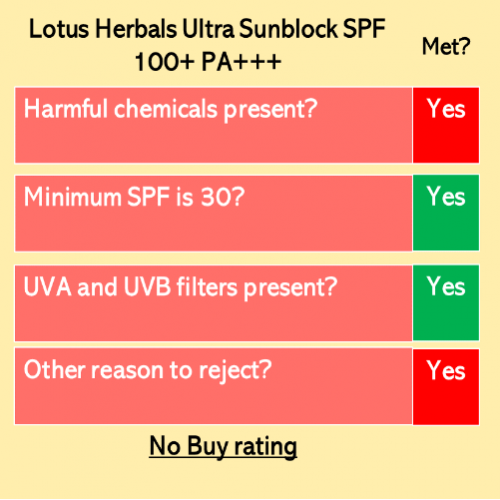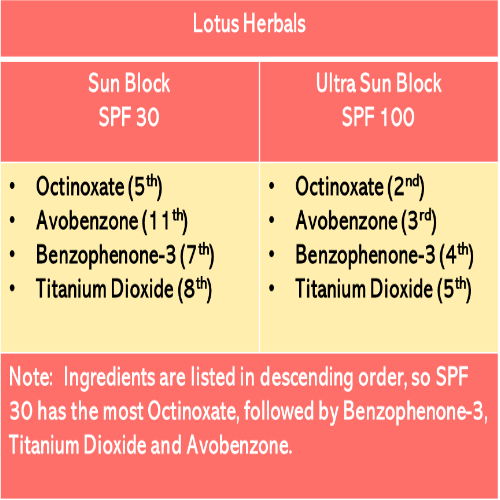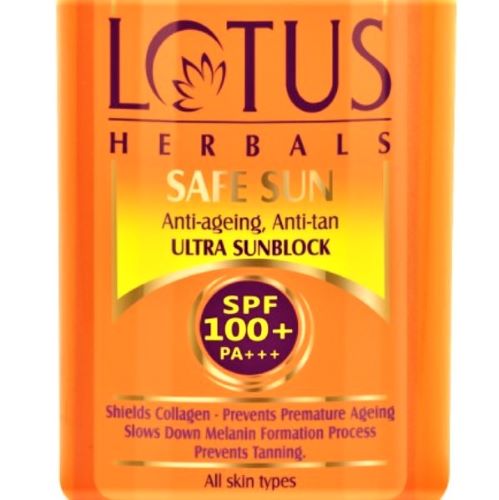
My view: Give it a miss
1) Harmful chemicals
The harmful chemical is Benzophenone-3 (or Oxybenzone), which is a hormonal disruptor and a known skin allergen (and for more information see Chemicals to Avoid – Oxybenzone).
2) UVA and UVB filters: has anything changed from SPF 30?

Both UVA and UVB have both been implicated in skin cancer and photo-aging and we want filters to protect against both types of damage.
The main UVB filter is Octinoxate, a very effective UVB filter. As its the second most abundant ingredient in this product, along with Oxybenzone (at no 4) and Titanium Dioxide (no 5), this product in all likelihood is SPF 100.
Honestly, the only way to confirm SPF 100 is in a lab for Indian sunscreens. But that’s not even an issue because the “The UVA filter debacle” continues.
2a) Not the UVA filter debacle – again??
Lotus Herbals have chosen Avobenzone as its primary UVA filter. This is a gold standard UVA filter that is notoriously photo-unstable. Avobenzone degrades quickly upon exposure to sunlight, reducing its efficacy by as much as 50 and 90 per cent after 60 minutes of exposure.
This product uses Benzophenone-3 to stabilise this notoriously unstable UVA filter. Usually you’ll find multiple stabilisers in decent products, but let’s forgive Lotus Herbals for the moment.
Such generosity I hear you say. Well, the product by adding Octinoxate and Titanium Dioxide make Avobenzone photounstable. Also, Octinoxate becomes unstable in this combination.
The study listed below shows that a mixture of Octinoxate (Ethylhexyl methoxycinnamate) and Avobenzone shows less absorbance after UV exposure, indicating a photo-unstable formulation.
Therefore, having Avobenzone adds nothing to this product. Click on LINK for more information.
3) Other reasons to reject this product?
(See also Is SPF 50 Really Better than SPF 15?)
I don’t like SPF 100 sunscreens and the reason is more behaviourial than to do with the product itself.
Namely, the International Cancer Agency has found that when people use high SPF sunscreen products, they intentionally expose themselves to larger doses of UVR.
Therefore, folks using SPF 100+ can have a false sense of security – they think their skin is UVR resistant – and if they never normally step out during mid-day Chennai or New Delhi summer’s, they all of a sudden think that wearing SPF 100+ allows them to do so.
It doesn’t. Sunscreen just reduces the exposure to UVR – it doesn’t eliminate UVR risk. And as UVR damage is cumulative, intentional exposure to UVR only increases the risk of photoaging (wrinkles, hyper-pigmentation, loss of elasticity etc etc).
Closing remarks
Lotus Herbals is fully capable of formulating a product that has NO parabens or Methylisothiazolinone….but obviously this comes at a price – this product is gram for gram 8 times more expensive than Lotus Herbals SPF 30 offering.
The brand struggles to stabilise Avobenzone, which is a pity. I would also be remiss if I did not mention that the labelling on the products is quite mistaken. There is no such thing as “sun block”, “UV screen” and my all time favourite on this product:
Its SPF 100+ protection blocks all damaging effects of UV rays to your skin.
We are talking about sunscreen and not some invisible cloak that defends the wearer against photoaging and skin cancer.
It is my sincere hope that you read these claims with the same level of scepticism as I do.
Till next time! Drop me a line at email@happyskindays.com if you have any queries or comments.
See also Myths About Sun Protection, Top 5 sunscreen recommendations, Do You Understand The Gibberish On Sunscreen Labels?
Sources and uses:
US20170326062A1 (US Patent application pending),
US9956163B2 (Having previously been published, pre-grant publication) ;
https://www.ncbi.nlm.nih.gov/pubmed/?term=Roberts%20WE%5BAuthor%5D&cauthor=true&cauthor_uid=26366102
Ceresole, R., Y.K. Han, M.A. Rosasco, et al., “Drug-Excipient Compatibility Studies in Binary Mixtures of Avobenzone,” Journal of Cosmetic Science, vol. 64(5), pp. 317-328, 2013.
Nash, J.F., and P.R. Tanner, “Relevance of UV Filter/Sunscreen Product Photostability to Human Safety,” Photodermatology, Photoimmunology and Photomedicine, vol. 30(2-3), pp. 88-95, 2014
Wendy E Roberts, Lily I Jiang, and James H Herndon, Jr, “Facial primer provides immediate and long-term improvements in mild-to-moderate facial hyperpigmentation and fine lines associated with photoaging” Clin Cosmet Investig Dermatol. 2015; 8: 471–477.
